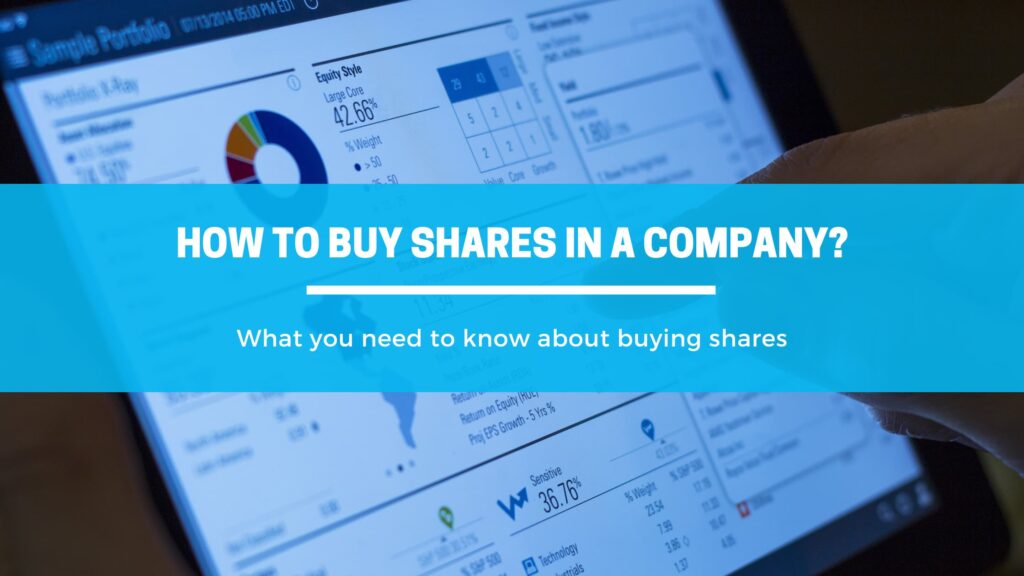Whether you are building a nest egg or simply want to bet on a company for long-term growth, buying company shares is an ideal way to go about the process.
With good research and analytical skills, you can even get shares of a company before it goes public.
In this article, we'll walk you through how to buy shares in a company, including researching the company, selecting a brokerage, and making the trade.

Benefits of Buying Company Shares
When a company issues stock, it sells ownership in the form of shares to the public. Each share represents a unit of ownership in the company. As a shareholder, you are entitled to a portion of the company's profits, voting rights on important corporate decisions, and potential dividends.
When you buy a share in a company, you become a part-owner and have a stake in its success or failure. The value of your investment can go up or down based on the company's performance and the stock market as a whole. Common benefits include:
- Potential for long-term growth: Long-term investment growth as the company grows and its stock price increases.
- Diversification: Investing in a variety of companies can help to diversify your portfolio, spreading risk and potentially reducing overall portfolio volatility.
- Potential for passive income: Some companies pay dividends to their shareholders!
- Liquidity: Publicly traded shares can be easily bought and sold on stock exchanges, providing liquidity and allowing you to access your funds quickly if needed.
Step-by-step Guide to Buying Shares in a Company
Some companies have direct stock purchase plans (DSPs) for buying stocks whereas for others you will need an online brokerage account to buy/sell stocks. Follow the steps given below to buy shares in a company:
1. Open a Brokerage Account
Before you can buy shares, you need to open a brokerage account. Most brokerages offer online accounts with varying fees and services. Research and compare different online trading platforms to find the best one for your needs.
Consider the following factors:
- Fees
- Types of investments available through the brokerage, such as stocks, bonds, mutual funds, and exchange-traded funds (ETFs).
- Ease of use and easy-to-navigate user interface
- Research and educational resources available for users
- Customer support
- Reputation and reliability
After you have picked a brokerage, proceed with the new account application. For this, you must have your photo identification, social security number, and bank account details.
If you want certain tax advantages, you can also open an individual retirement account (IRA).
2. Pick the Right Stocks
As Warren Buffett famously said, “Buy into a company because you want to own it, not because you want the stock to go up.”
It's important to keep in mind that investing in the stock market involves risk and past performance is not a guarantee of future results. When looking for a company to invest in, always analyze the following factors:
- The company's financials: Analyze the company's balance sheet, income statement, cash flow statement and other relevant documents to get an idea of its financial health.
- Research the management team: Learn more about the management team and evaluate their track record in leading a successful business.
- Industry outlook: Research the industry to get an idea of the challenges and opportunities it is likely to face in the future.
- Competition: Look at how the company's competitors are performing and how they stack up against each other.
- Analyze the company's overall performance: Take into account factors such as sales trends, profit margins, debt levels, return on investment (ROI), and other metrics.
Here is an easy guide on how to pick stocks and companies to invest in.
3. Decide the Number of Shares You Want to Buy
Your next step is to decide how much you have to invest in the company's shares. Make sure to factor in your risk tolerance, financial goals and time horizon when deciding on an amount. Also, keep in mind that the stock market can be volatile so consider diversifying your investments by investing in multiple companies.
Determine the total amount you're willing to invest in each company, and then divide that number by the share price. Searching for the ticker symbol or business name will bring up stock values on your brokerage's platform.
If your stock broker accepts fractional shares, you may buy as little as one share or as many as you want for any given amount of money. Some brokerages don't deal in fractional shares, so you may have to round down to the next full number of shares when calculating how much you can purchase.
For example, if you want to invest $1000 in Apple, whore shares are selling at $27, you can:
- Either buy a full 37.03 shares
- Or purchase 37 shares if fractional shares are not allowed
4. Choose an Order Type
Once you are ready to invest, place an order using your brokerage's website or trading platform. You can choose between a market order, which executes at the best available price, and a limit order, which allows you to set parameters for the trade.
When buying shares in a company, you need to determine the type of order you are placing with your broker. Several types of orders allow you to customize how your order is executed and how long it will remain active in the market.
- Market Order – This is when you need to buy or sell a specific number of shares at the current market price. This order will be executed almost immediately, but you may not get the best possible price as it is based on what buyers and sellers are willing to accept at the moment.
- Limit Order – A limit order is an instruction given to a broker to buy or sell a specific number of shares at a price that is set by the investor. This order gives you more control over the price that you will pay or receive for your shares.
- Stop Order – You should place a stop order if you want buy or sell shares when they reach a certain price. This type of order is usually used in order to protect profits or limit losses. For example, if you have purchased shares at $100 per share and the stock rises to $150, you can place a stop order to sell them at $140 in case the price starts to decline.
- Stop-Limit Order – A stop-limit order is a combination of the two previous order types. It consists of two components, a stop price and a limit price. The order will be triggered when the stock reaches the set stop price. Once this happens, a limit order is placed at the specified limit price in order to reduce the risk of market fluctuations.
- Day Order – A day order is an instruction given to a broker to buy or sell shares on the same day. If the order is not filled by the end of the trading day, it will be automatically canceled and will not carry over into the next day.
5. Place an Order
Once you have picked the kind of stocks you want to purchase and finalized on a company, navigate to the buyer’s tab and place the order.
Then tap the ‘place order’ button and your stock purchase will be executed. You should now be able to see your purchase history and stock value in the ‘portfolio’ section of the platform.
The only thing that’s left to do now is to track the performance of your investments. While daily fluctuations should not be worried over, you may want to sell your stock if you see a consistent downturn over a long-period of time.
You can review account statements, check stock index daily, and follow the general economic market to predict the direction of your portfolio in general.

Buying Shares in a Domestic vs Foreign Company
Buying shares of foreign companies can be quite expensive and risky if you follow the usual approach. Instead, a better way is to use mutual funds or exchange-traded funds (ETFs).
These funds are created by investors with a good track record of managing portfolios. You will allow a fund manager to lump shares in an index basket of the companies you like.
When investing in a foreign country, you should ideally also have a bank account or someone (a broker) to have the power of attorney over your assets.
A broker will also offer exchange rates so that you can make the purchase in the company's local currency. You can then place an order just like you do with a domestic company.
Buying Private Company Shares in a Tender Offer
To do this, you must first verify that you are an accredited investor. In countries like the US, only accredited investors can purchase shares in private companies.
Investors who qualify as “accredited” have both the means to bear the financial consequences of a loss and the knowledge to assess those risks responsibly. You need to meet the following requirements:
- Earned income more than $200,000 a year (or $300,000 coupled with your spouse)
- Must have a net worth of more than $1 million, which does not include the value of your primary residence
Once you qualify, you can go to platforms such as SharesPost and SecondMarket where companies list stock options on the open market. You can also find some lucrative direct tender offers in finance new reports, as companies often post ads to publicize their tender offer.
Then, you can purchase the funds by offering money before the tender offer closes.
Did you know? If you're planning on purchasing stock options from an individual entity, you should be aware that the corporation may have imposed restrictions on the transaction. The right of first refusal is the most common provision, it allows the corporation to buy back its own shares before the holder sells them to a third party. These kinds of restrictions are applicable for a time period of 2-3 weeks, and once this time elapses, you can freely trade the shares.
Additional Tips To Keep in Mind When Buying Company Shares
- Make sure the company has a good track record of success before making an investment.
- Don't focus too much on short-term gains, but look for steady growth in the long run.
- Consider diversifying your portfolio by investing in different kinds of stock options and companies across different industries and countries.
- If possible, try and purchase stocks in bulk to get discounts or reduced brokerage fees.
- Try to limit your stock trading activity so as not to incur too much transaction cost.
- Make sure you understand the risks associated with investing before making any decisions.
- Staying informed about the company's performance and the stock market in general can help you make better decisions.
- Monitor your investments regularly to stay up-to-date with any changes or trends in the market.
- When selling stocks, use a price comparison tool to find the best deals on transaction fees.
- Always consult financial advisors or experts before investing in stocks.
These are just some of the tips to consider when buying shares in a company. For more detailed information, it is best to consult a professional financial advisor or a stockbroker. Keeping these tips in mind can help you make informed and profitable investments in the long run.
Conclusion
In conclusion, buying shares in a company can be a great way to grow your wealth and participate in the success of the companies you believe in. Following the steps outlined in this article, you can learn how to buy shares in a company, including opening a brokerage account, researching the company, and choosing the right stocks. Remember that investing always carries some level of risk, so be sure to do your due diligence and invest wisely.
With careful research and analytical skills, you can make sound decisions when it comes to buying company shares, ensuring a secure financial future for yourself.
Good luck investing in your future!
FAQ
What is the minimum number of shares I need to buy in order to invest in a company?
The minimum number of shares you need to buy in order to invest in a company depends on the company's individual stock policy. Some companies may require that you buy at least one share, while others might have higher thresholds. Generally speaking, it is possible to purchase fractional shares if the price per share is too high; however, this may not be available for all companies. You may want to consider the cost of investing in a smaller number of shares compared to a larger amount when making your decision.
How long does it take for my order to be processed and executed?
The amount of time it takes for an order to be processed and executed depends on a variety of factors, such as the type and size of your order. For example, if you are placing a market order, it will typically be filled almost immediately; however, limit orders may take longer to fill depending on the market conditions. The number of shares you are purchasing will also affect the processing time. Generally, larger orders may take longer to be filled than smaller ones.
What types of fees or costs will I incur when buying stock in a company?
When investing in a company, you may incur various fees and costs such as commission fees, broker fees, transaction fees, and taxes. Brokers typically charge commission fees to cover the cost of executing your order. Broker fees include charges for account maintenance or other services rendered by the broker. Transaction fees may be applicable when buying or selling shares, and they vary depending on the type of order placed. Additionally, taxes may be applicable when investing in a company.
Are there any restrictions or eligibility requirements when buying shares in a company?
In some cases, there may be restrictions or eligibility requirements when buying shares in a company. For example, certain companies may require that you meet certain criteria such as having a minimum amount of money invested in the company before being able to purchase shares. Additionally, some companies may not allow shareholders from outside their country or region to invest in the company.
Can I sell my stock at any time, or is there a window of opportunity?
The ability to sell your stock will depend on the company's policy. Generally, you can sell your stock at any time; however, there may be restrictions on selling during certain times or for a specified period.




